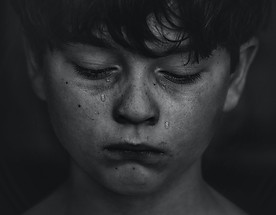
Tips for young people
Drug abuse
If you think you may be affected by post-traumatic stress disorder (PTSD), you're not alone. Find out more about the condition and what support is available.
What is PTSD?
Post-traumatic stress disorder (PTSD) happens after you experience something extremely frightening, like violence, abuse, rape or a life-threatening situation.
It can also affect you if you witnessed something terrible happening, such as a serious accident.
Most people take time to get over a traumatic event, but with PTSD, you can't move past the event and carry on having dreams, flashbacks or upsetting thoughts about it.
Complex PTSD (C-PTSD) is a more serious reaction to a long-lasting traumatic experience, for example abuse, neglect or frequent violence.
If you think you might be affected by PTSD, you are not alone. It can be really scary, but help is available.

Symptoms
Symptoms can appear straight after a traumatic experience, or later on. They're usually noticed within six months of the experience.
The main symptoms of PTSD are:
-
flashbacks or nightmares about what happened
-
avoidance and numbing, where you try to keep busy and avoid thinking about or doing things that might trigger memories of the traumatic event
-
being tense and on guard all the time in case it happens again
Just because you experience one or more of these symptoms, it doesn’t mean you’re definitely affected by PTSD. It’s important to talk to your GP to get a full diagnosis.
You may also experience:
-
anger or irritability
-
problems sleeping or eating
-
survivor's guilt, where you feel bad because others suffered more than you
-
depression
problems with alcohol or drug abuse -
diarrhoea
-
muscle aches
-
difficulty remembering all of the traumatic event
Treatment
PTSD can be treated through cognitive behavioural therapy (CBT), which can help you find new ways to cope with your thoughts and feelings about what happened.
You may also be offered EMDR (eye movement desensitisation and reprocessing), a technique that uses rapid eye movements to reduce distress from bad memories.

Tips from our team
Our Activists and other young people share their tips and advice on PTSD.
More information & support

Depression

Anxiety
Suicidal thoughts

Self harm

Get help now
Childline
If you’re under 19 you can confidentially call, chat online or email about any problem big or small.
Sign up for a free Childline locker (real name or email address not needed) to use their free 1-2-1 counsellor chat and email support service.
Can provide a BSL interpreter if you are deaf or hearing-impaired.
Hosts online message boards where you can share your experiences, have fun and get support from other young people in similar situations.
Opening times:
24/7
0800 11 11
Samaritans
Whatever you're going through, you can contact the Samaritans for support. N.B. This is a listening service and does not offer advice or intervention.
Opening times:
24/7
116123
You are not alone...
We can assist you whether you want to learn more about how you're feeling and discover strategies for feeling better or if you want to support someone who is having a hard time.


I am a young person

Join the team
I work with young people

